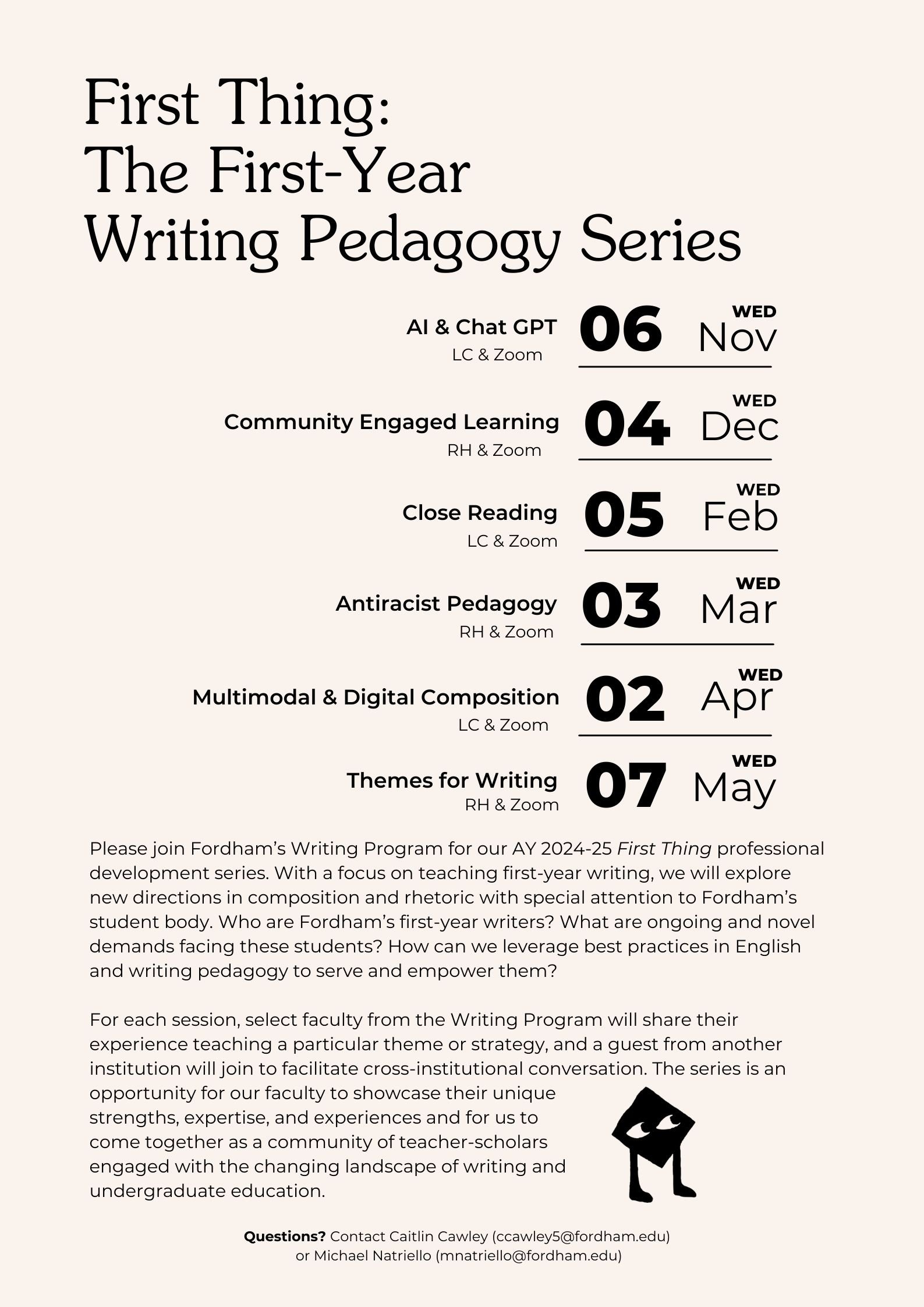The First Thing Series Has Begun!
By Kate Behrens
Last week, the First Thing: The First-Year Pedagogy Series began with a fascinating and timely conversation on student usage of Artificial Intelligence and ChatGPT in classrooms, writing centers, and libraries. The event featured three Fordham faculty members, Dr. Elisabeth Buck, Dr. Kirk Quinsland, and Leanna McLennan, as well as Dr. Rebecca Hallman Martini, who joined from the University of Georgia. The presenters showcased their original research regarding student use of AI. The conversation that followed highlighted the concerns, misunderstandings, and fears of students and faculty regarding the consequences, efficacy, and ethics of ChatGPT in an academic setting.
All of Wednesday’s panelists drove home the reality of AI; it is not going anywhere. ChatGPT is a tool just like any other, and as such, instructors and prospective instructors must prepare to help students foster an AI literacy that functions both ethically and effectively. The student-centric approach to each study was a refreshing take on a popular topic as it reflected the student, their usage patterns, and their perceptions of ChatGPT. As Dr. Hallman Martini and Professor McLennan found, most of their participants did not trust using ChatGPT outside of assisting them with math homework, writing emails, or writing pieces that do not take much synthesis or analysis. Or, as Dr. Queensland and Dr. Buck shared, ChatGPT can be exceptionally useful in the early process of a paper, for instance, as a brainstorming exercise or as a means of generating an outline. When thinking about ChatGPT as a tool for beginning stages of writing or non-academic writing, it is productive to embark on conversations about bringing it into the classroom to acknowledge its presence and find creative strategic usages of AI.
As the presenters demonstrated, there is a common sense of mistrust among students regarding the quality of AI-generated writing; however, students continue to turn to websites like ChatGPT to assist them with their writing. One thing that came through abundantly clear was the topic of student confidence. With 15 years of writing center experience, Dr. Buck asserted that the students do not feel their work is up to par with the quality expected by professors. Her observation was confirmed by the other presenters, who demonstrated that the overuse of ChatGPT often reflects a student's low confidence in their writing. The conversation on Wednesday proposed that considering ways to boost students’ confidence levels could be a part of the solution in preventing students from using ChatGPT as a cheat code. Perhaps it is more in-class writing and discussion questions, as suggested by Leanne McLean.
The attitude of the event was surprisingly optimistic, given that the rise of ChatGPT and the death of academia are often spoken about in conjunction. While ChatGPT is undoubtedly evolving, it is still not entirely "there." This moment is crucial for instructors and institutions to prepare for where artificial intelligence is going in order to generate strategic pedagogical methods to harness the capabilities of AI. Continuing these discussions will surely lead to ways in which institutions and instructors can help students use ChatGPT and all other models of AI-generated writing in ways that are ethical and beneficial to their education.
Be sure to catch the next installment of the First Thing: The First-Year Pedagogy Series on December 4th, 2024, which will focus on Community-Engaged Learning!

